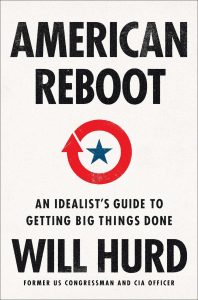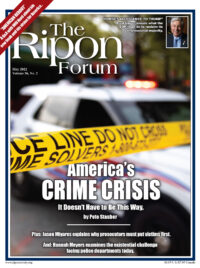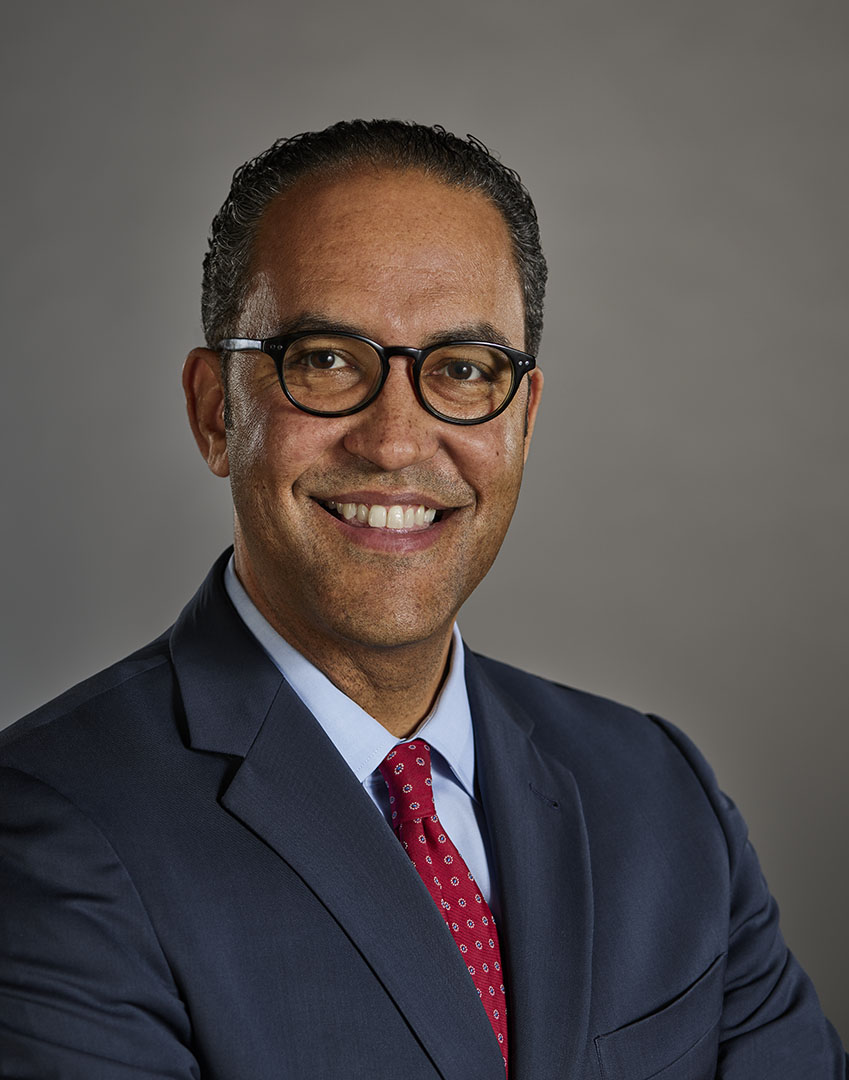A Conversation with Will Hurd
Will Hurd has had a fascinating career. A former cybersecurity executive, undercover officer with the CIA, and U.S. Congressman representing the 23rd District of Texas, he is now a managing director with Allen & Company, where he is working with entrepreneurs on the cutting edge of technology to anticipate the shockwaves of the future.
Hurd is also the author of a new book called American Reboot: An Idealist’s Guide to Getting Big Things Done. Described as a “bold political playbook” that offers “solutions to the era-defining crises that will shape the next 30 years,” the book is a combination of lessons that Hurd has learned over the course of his life, and recommendations to both the Republican Party and the American people moving forward.
One could argue that the American people themselves are the stars of the book, and Hurd is their greatest admirer. Indeed, many of the lessons set forth in its pages are lessons that Hurd learned himself from the people he met on the campaign trail and while serving as their elected representative in Washington. If there is a villain in the book, it is members of Washington’s professional political class, who counseled him as a candidate to limit his campaign to traditional Republican areas, and then rolled over without a fight as extreme forces took over the GOP.
Hurd calls himself a “pragmatic idealist.” It’s easy to understand why he chose to leave congressional gridlock behind when he describes what that term means to him. “You talk about the things that matter and about what’s happening now,” he explains, “and you do it in a way that has an impact on the greatest number of people possible.” Today, Hurd’s greatest impact is being felt in the interviews and speeches he is giving about American Reboot and the vision it lays out for the future of America.
The Forum talked with him recently about the book and his vision, and where he would like to see his country and party go in the next few years.
________________________________
RF: You open the book by talking about your first campaign for Congress in 2010. You lost the election, but write that you walked away with some important lessons, one of which was the importance of showing up in places you weren’t expected. Could you talk about that and other lessons you learned on the campaign trail, and its relevance for Republicans and all elected officials today?
WH: I had to grow in order to win and beat someone who was fairly entrenched in local politics. I had to do something different. And that’s why I showed up in communities that had never seen someone like me. What I learned was that they cared about the exact same things as everybody else. They cared about putting food on the table, a roof over their head, and taking care of the people that they love and making sure those people were healthy, happy, and safe.
That lesson made me realize the disconnect sometimes between how people encapsulate what’s going on in the world via cable news or social media versus reality. That lesson was important. And then the other lesson I learned was that campaigns are actually quite straightforward. ID your voters and turn them out.
My tactical error in not doing that in that first campaign is something that I made sure I didn’t forget.
 RF: When you look at the last election, Republicans like Glenn Youngkin did make gains among Latino voters. Is that because he and other Republicans have started showing up in places they aren’t expected, or do you think it’s because Democrats have taken the Latino vote for granted for too long?
RF: When you look at the last election, Republicans like Glenn Youngkin did make gains among Latino voters. Is that because he and other Republicans have started showing up in places they aren’t expected, or do you think it’s because Democrats have taken the Latino vote for granted for too long?
WH: I think that the Democrats have not only taken for granted black and brown communities, but I think they have been wrong on two important issues that impacted those communities.
Those issues relate to law enforcement and the energy sector. In southwest Texas, for example, a large percentage of the population depends on law enforcement for their employment and livelihood. Another large percentage of the population is dependent on the energy sector for their livelihood. When you attack those two sectors, you are going to see an impact.
The opportunity for Republicans is to move beyond the thinking that we’ve seen over the last 30 years that the best way to win elections is to simply turn out the base. We need to grow the party beyond the base, because I don’t want to be in a governing position for only two years. I want to bring conservative values to the country for decades. And that means we have to broaden the coalitions and people who identify with the GOP.
We need to grow the party beyond the base, because I don’t want to be in a governing position for only two years.
RF: In the book, you call yourself a pragmatic idealist. What does that mean exactly?
WH: The idealist part is about helping the greatest number of people possible. The pragmatic part is by basing that off where we are right now. That’s how I would encapsulate pragmatic idealism, and that’s what I think most people want.
If you look at my home state of Texas, we went through a primary election on March 1st. Only three million people voted — that’s Republicans and Democrats combined out of 30 million. That voter apathy was because 27 million people, or a significant portion of 27 million people, didn’t think either side is providing something of value to them. Neither side inspired them, nor either side address the issues that these 27 million people cared about.
That’s why I think this philosophy of pragmatic idealism works. You talk about the things that matter and about what’s happening now, and you do it in a way that has an impact on the greatest number of people possible.
RF: Picking up on that point, you also write about the political make-up of Congressional Districts and how they have been redrawn in a way that caters to the extremes. How can a pragmatic idealist such as yourself win in this kind of political environment?
WH: You win the way I’ve always won — by bringing new voters into the primary. The professional political class tells you to talk only to ‘likely’ Republican primary voters. Which means only the people who have voted in the last four Republican primaries.
When you’re only talking to the people who are supporting you, then the outcomes are always going to be the same. And when those people are somewhere between only two percent and six percent of the entire electorate, that’s why we only talk to the edges of the party and not the middle.
RF: Which is more broken in your opinion – our political system, or our system of government?
Will: Well, the two are interrelated, right? Our political system drives our system of government. And our political system today is designed not to produce problem solvers. It’s designed to produce bomb throwers.
Our political system today is designed not to produce problem solvers. It’s designed to produce bomb throwers.
RF: Picking up on the title of your book, how would you reboot our political system?
WH: It’s about having elected leaders who inspire rather than fearmonger. It’s about having leaders who ensure that their audio and video match — meaning the things that they say are reflecting the things that they do.
You have people in our party who are not jerks, misogynists, or homophobes. And you have people in our party who recognize there is way more that unites us as Americans than divides us and are willing to focus on trying to address some of those issues where there is conceptual agreement on what needs to be done.
So for me, reboot is about getting back to a fresh instance of the operating system. It’s not changing things or getting rid of things.
RF: And how about our system of government – what are some of the key steps you would take to reboot that?
WH: Let’s start with foreign policy. After being connected to the national security apparatus or the national security community for over two decades, I have come to believe in a simple principle — your friends should love you and your enemy should fear you. When you have the President of Ukraine asking us to do more and the President of Russia increasing the death and destruction, that means the President of Ukraine isn’t in love with you because he wants you to do more, and the President of Russia is not afraid of you because he doesn’t think you’ll do anything in response.
I think when it comes to the conflict that will determine whether or not the American economy stays the most important economy in the world, the fate of that conflict will be determined by a number of advanced technologies, like 5G, artificial intelligence cloud computing, hyper-sonics, and biotech. If the federal government continues to show an inability to introduce new technologies into the government at speed, or work with the private sector effectively, or cooperate with our allies in these areas, then the rest of the century is not going to stay the American century. I believe we can. But one of the problems we have in the government is we always think about the last war. We need to get our eyes looking through the windshield, rather than the rear-view mirror.
RF: You mentioned Ukraine. As a former intelligence officer with the CIA and member of the House Intelligence Committee on Capitol Hill, what is your assessment of the situation in Ukraine and U.S. policy in that regard?
WH: My assessment is that America should be doing more. The reason I say that is because we always think that we’re going to understand the second, third, fourth, and fifth order of effects of what’s going to happen. If we do something, we’re going to always get those things wrong. So go back to the first principles. And the first principle in this case is, are we doing absolutely everything we can within our power to prevent the massacre of innocent people? I’m not talking about sending American troops. But we should be sending as much equipment that the Ukrainians can absorb.
Also, why did Vladimir Putin make this decision now? Because he watched what happened in Afghanistan and the disaster of the pullout from Afghanistan and he assumed that the American public had no appetite to support Ukraine. Putin misread the resolve of the Ukrainian people and he misread the resolve of the Western Alliance. But the longer this conflict goes on, the more impact it’s going to have on our European allies having to deal with the effect of sanctions and the growing humanitarian crisis with Ukrainian refugees. That’s going to put pressure on these governments, and we may start seeing fissures within the Western alliance.
RF: Finally, turning your attention to the upcoming election – Republicans are now expected to retake the House and possibly the Senate. Do you have any advice for your former colleagues as they campaign this fall and look to possibly take the reins of government next year?
WH: In 2022, when Republicans win, we are going to win because Democrats have been incompetent and because the American public is not interested in the kinds of things Democrats were trying to do. That means we have to put forward a vision of where we think we need to go. And when we have control, we need to actually solve problems.
Because if we don’t solve some of these major problems — which is going to require working with the Biden Administration — then all of the problems in the country are going to get blamed on a Republican Congress, and then we’re going to see the exact opposite result in 2024.
—###—





